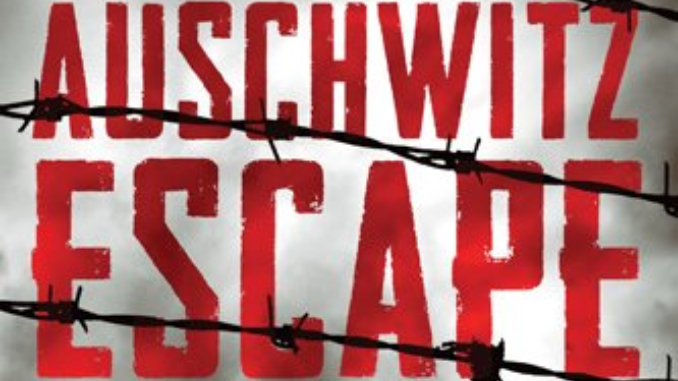
Also by this author: The Jerusalem Assassin
Published by Tyndale on October 1, 2014
Genres: Christian, Fiction, Historical, Thriller
Buy on Amazon
Goodreads

Evil, unchecked, is the prelude to genocide. As the Nazi war machine rolls across Europe, young Jacob Weisz is forced to flee his beloved Germany and join an underground resistance group in Belgium. But when a rescue operation goes horribly wrong, Jacob finds himself trapped in a crowded cattle car headed to southern Poland.
Sentenced to hard labor in the Auschwitz labor camp, Jacob forms an unlikely alliance with Jean-Luc Leclerc, a former assistant pastor who was imprisoned for helping Jews. They've been chosen for one of the most daring and dangerous feats imaginable--escape from Auschwitz. With no regard for their own safety, they must make it to the West and alert the Allies to the awful truth of what is happening in Poland before Fascism overtakes all of Europe. The fate of millions hangs in the balance.
Joel Rosenberg is best known for his seemingly prophetic political thrillers. In the 2000s, it seemed as if the man couldn’t write something in his books without a version of it coming true in reality. The 2010s saw a shift in Rosenberg’s writing. For the past three years, he’s worked on a series called The Twelfth Imam that I felt did not reflect the quality of his previous work, so it was with some apprehension that I dove into The Auschwitz Escape.
Whereas all of Rosenberg’s previous novels have been political or eschatological (or, mostly, a combination of the two), The Auschwitz Escape is, of course, a historical novel. Rosenberg’s research shows through immediately as he is able to immediately get readers into the setting and the mindset. The story follows two main characters: Jacob Weisz and Jean-Luc Leclerc.
Leclerc is an assistant pastor in occupied France who gets their entire community into secretly helping the relief movement. Thousands of Jews show up at their door and they help every one. But eventually, the Nazi war machine takes note.
Weisz is just a kid—teenager to early twenties throughout most of the book—but becomes a part of the Resistance when the Nazis kill his parents for being Jews. He was supposed to rescue prisoners being shipped to Auschwitz. Instead, he ended up on the train as a prisoner.
The story mainly follows Weisz’s experience in Auschwitz, but after a while, he meets Leclerc and the two become involved in an escape operation. At first they want to escape to be free from the atrocities of the death camp. But soon, they want to escape so that they can lead an army back to raze it to the ground.
This is the power of Story. When you hear that six million Jews were killed in the Holocaust, that number flits right by you because you don’t have the capacity of understanding the size of the number. Two is a number we can understand. Two is a number we can care about. Especially when you give them names and families and secret loves. Especially when you take us into their thoughts and feelings. Now we have a connection. Now the story resonates. Now you can understand what they went through. Give me a fact and it goes right by me, tell me a story and you might get my attention. Joel Rosenberg has told a story that’s bound to get attention.
However, I do have one criticism. We know how history goes. Early reports that the Nazis were systematically exterminating the Jewish people were considered exaggerated or unreliable. There was some push to bomb the train tracks leading to Auschwitz, but nothing ever came of it. Yet Rosenberg decides not to finish with the escape, but continues on for thirty more pages, most of it Weisz trying valiantly to get someone to do something. Rosenberg’s goal may have been to talk about the indifference of the international community, but to provide it in such a compressed format meant a couple things.
First, Rosenberg did a lot of telling, rather than showing. Rosenberg tries to fit as much as he can into four chapters to show all the ways that those with knowledge about Auschwitz tried to get others to listen. Weisz, who has been an individual character for 450 pages, suddenly becomes a blatant symbol and a conglomeration of a number of historical personages. (Most notably, Rudolf Vrba and Alfred Wetzler, the actual authors of the Auschwitz Protocol.) The liberation of Auschwitz is compressed into two pages and then he jumps forward seventy years for a short epilogue that wraps up way too many of the loose ends too quickly and too neatly.
Second, in those last thirty pages, Rosenberg loses the balance between telling a story and crafting a political and religious point he’d done so well at over the bulk of the book. Until this point, Rosenberg’s message had been carried by the story. But in the last thirty pages, the reverse happens. The message becomes the story, leaving it to conclude in a contrived and overwrought way. In my opinion, Rosenberg should have either cut the story on page 451 or expanded the last thirty pages into a hundred and kept the story at the center.
But, let me end on a note of praise. This is a very good book. Stories have power, and I am afraid that as the last of those who lived the Holocaust and World War II die, we will fail to remember the lessons the war taught us. The Auschwitz Escape is a great story about a terrible time in history and we would do well to read it, be moved by it, and hopefully drawn to learn more about the historical events that inspired it.

Be the first to comment